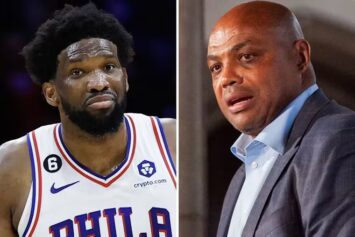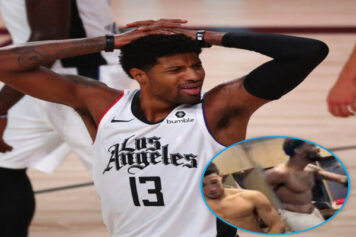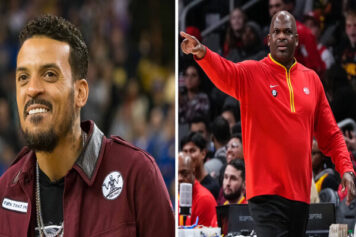Richard Pryor’s Brewsters Millions remake was a film made before my time, but its plot is a concept that’s as appropriate as any for the NBA at this point in history.
Richard Pryor’s comedic adventure to squander a $30 million dollar fortune in 30 days without alerting anyone to the true $300 million awaiting him if he succeeded in going bankrupt was a goofy ‘80s comedy that provided plenty of hijinks. It’s also a wise business model, but in the NBA it’s provided plenty of consternation. If there was a second modernization of Brewsters, the script should be restructured to revolve around the owner of a moribund NBA franchise.
As the most anticipated draft lottery in recent years nears for the Bucks, Lakers, Celtics, 76ers, Magic, Jazz, Kings and Pistons, the conversation has shifted to how teams have seemingly played possum just foe a shot at more ping pong balls.
Duke's coach Mike Krzyzewski finds the whole thing un-American.
"As an American, I wouldn't like to think that an American team would want to lose or create situations where you would want to lose," Krzyzewski said following Duke's 94-83 loss to Wiggins and Kansas in November.
Coach K’s comments were in response to a mystery general manager revealing his nefarious plan to tank the season like a Vince McMahon pay-per-view.
"You need superstars to compete in this league, and the playing field for those guys is tilted toward a few big-market teams. They are demanding trades and getting together and deciding where they want to go in free agency. It's tough for us to compete with that. So a high lottery pick is all we have."
"How do you pull it off? First, you talk it over with ownership. I analyzed the team and told them what I wanted to do, the guys I wanted to get rid of and the guys with future value whom we wanted to keep. We obviously traded away some of our veteran guys who gave us a better chance of winning right now for future draft picks and young players. The owners didn't want to tread water any more than I did. They'd rather go down to the bottom with the hope of coming up, so they signed off on it. It wasn't a fight at all. In a different season, it might not make sense, but this draft certainly makes it more appealing."
As exceptional of a coaching mind as Coach K is, he’s a college coach and I side with the opinion of the anonymous pro general manager. Top 10 recruits scurry to Duke’s campus like thirsty dudes scurrying to view Rihanna’s latest Instagram selfie. He doesn’t know the NBA struggle. Tanking isn’t a surefire path to contention, but rather a high-risk, high reward alternative to striving to finish ninth in the conference and settling for the 10th overall pick.
Solutions to solving tanking are the new "War against Drugs." Everyone wants to be the architect of a punishment for this victimless philosophy.
In March, new Sacramento Kings owner Vivek Ranadive went public about his own alternative to tanking—or at least end it after the All-Star break in a Q&A with TrueHoop’s Jared Dubin.
"There’s two parts to it. Part one is that you freeze the draft order at the time of the All-Star break. Then, everything [pertaining to the current lottery system] remains the same, but it’s frozen based on the standings at the All-Star break. Then there’s no gain in not playing at the highest level for the remainder of the season. That’s part one."
"Part two is that at the end of the season, the top seven teams from the Eastern Conference and the top seven teams from the Western Conference make the playoffs. Then for the eighth playoff spot, the remaining eight teams have a sudden-death, college-style playoff in a neutral venue, like Vegas in the West and Kansas or Louisville in the East."
Celtics assistant general manager, Mike Zarren, who was an insider during the Celtics failed 2006-07 tank job, formulated a wheel that would drastically alter the draft by assuring that each team would pick in each of the 30 positions for the next 30 years. The proposal picked up steam and will be reviewed this summer. Of course, this type of rigid structure would ignore the departure of high draft picks like LeBron James leaving small market franchises behind in their prime.
The contrast to a world where the league’s worst teams reconstruct through the draft is a system in which bad teams in unfavorable small markets don’t have an opportunity to draft the best young talent or replace the ones who left them behind.
Tanking is a risk, but it’s a lot better than the potential of existence without hope. Punishing teams that are bad is like raising taxes for the poor while offering big businesses tax breaks. Desperation needs an outlet and the draft lottery is the ticket of salvation.
The proposed wheel system could have the unintended effect of miring bad teams in stasis at the bottom of the standings. The logo for this new system should feature a hamster on a wheel because that’s the fate it would be resigning the league’s worst teams to.
The grass is always greener on the other side. The current system has its pockmarks, but the idea of a system that further dismantles the possibility of parity could leave a crater in the league’s core. Gutting rosters is a wiser business strategy than remaining stagnant for half a decade. Ticket sales suffer in the interim, but aside from the Elgin Baylor-era Clippers, the goal has always been to aim for that larger prize.
Acquiring superstars through the draft is the only way a team like New Orleans or Cleveland can duplicate what the Lakers and Heat accomplish through free agency. The Indiana Pacers are a miracle of modern NBA team-building science. If they win an NBA title, they’d be an even more abnormal anomaly than the ’04 Detroit Pistons.
The top seeds in the East and Western Conference are each prominent thanks in part to a top-3 pick they drafted and buoyed with quality talent (OKC Thunder, San Antonio Spurs), a slew of them that they poached from smaller markets (Miami Heat, Brooklyn Nets) or both (Los Angeles Clippers, who used Blake Griffin as a lure for Chris Paul to re-sign).
Upward mobility is the name of the game. There’s an assumption that most teams aim for the bottom instead of merely enhancing their upward trajectory by ridding their rosters of fringe All-Stars who have them stuck on what Trail Blazers general manager Kevin Pritchard coined as the “treadmill of mediocrity”.
Whether or not, Milwaukee is awarded the No.1 pick in this summer’s draft is irrelevant. As long as they’re no longer stuck in limbo with Monta Ellis and Brandon Jennings, their upside is limitless. Superstars are the nucleus of championship contenders and there’s only one method for Milwaukee to attain that sort of talent
General managers around the league are already hamstrung by the luxury tax and the advantages of a select group of destination franchises that are consuming all of the all-world talent. The league office can’t take control of every aspect of NBA life. As long as individual players aren't being instructed to take a dive or taking it upon themselves to lose games, there’s no harm no foul.



